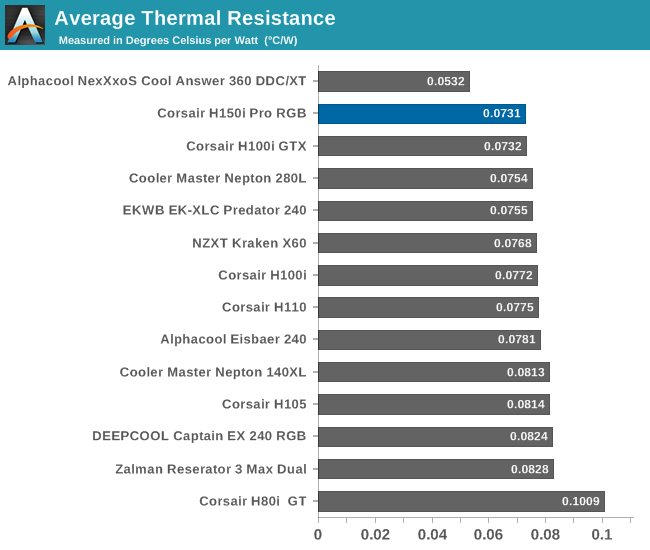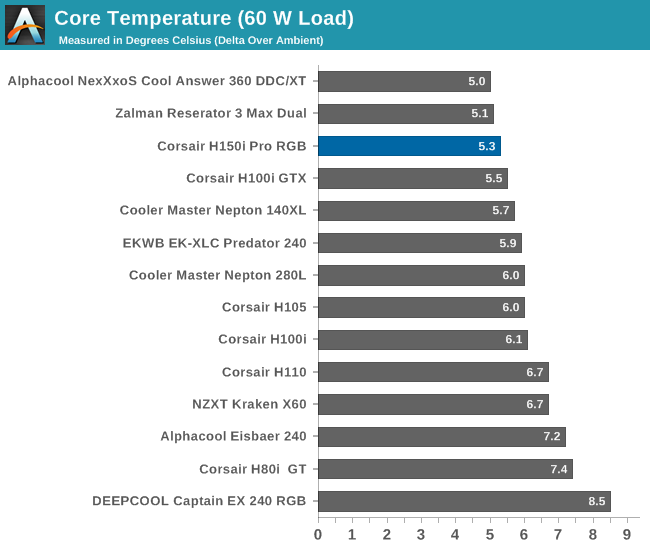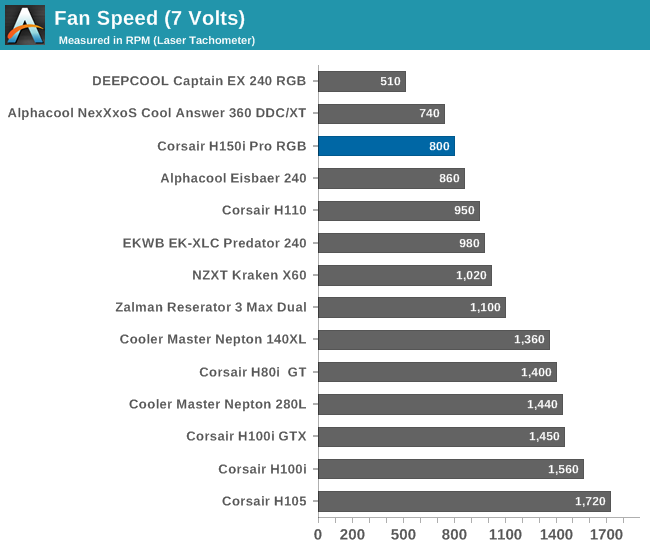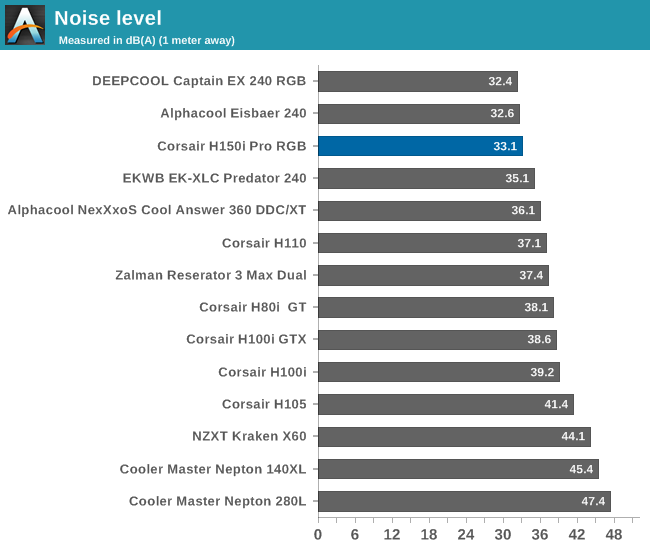The Corsair H150i Pro RGB AIO Cooler Review: The Quiet Giant
by E. Fylladitakis on August 16, 2018 8:00 AM ESTTesting Results, Low Fan Speed
Using a PWM voltage regulator, we reduced the speed of the fans manually down to half their rated speed, which is 800 RPM. The pump was also connected on the same power source, functioning properly at this low speed setting.


| Core Temperature, Constant Thermal Load (Low Fan Speed) |
The Corsair H150i Pro RGB is doing much better in this test, managing to almost match the thermal performance of larger (and much more expensive) liquid coolers. Both the low and high load thermal performance of the H150i Pro RGB are exceptional, outpacing most of the smaller AIO cooler implementations. The average thermal resistance is 0.0837 °C/W, hardly worse than the figures we recorded with the cooler's fans running at maximum speed.

Under these operating conditions, we recorded a sound pressure reading of just 33.1 dB(A), a very low figure for any kind of CPU cooler. The H150i Pro RGB will virtually be imperceptible with its fans running at 800 RPM inside a typical room. A slight humming sound will be perceptible in a quiet environment but its intensity is very low and certainly tolerable by even the most sensitive-eared users.











42 Comments
View All Comments
FireSnake - Thursday, August 16, 2018 - link
Nice review, thanks!Orange14 - Thursday, August 16, 2018 - link
So I can pay over $150 for a liquid cooler that will not out perform top of the line air coolers that are half the price or less. This is the height of madness.mkaibear - Thursday, August 16, 2018 - link
That's not entirely true - there's still a measurable and significant (>10%) difference between this and top end air coolers.Top end air coolers approach 0.1 C/W but this manages 0.07, for example.
It's not worth it to me, I'm happier with a high end air cooler every time - but for those who like running their systems on the edge for whatever reason there is a difference.
qlum - Thursday, August 16, 2018 - link
from what I understand tower coolers can start to rise in resistance when the the load exceeds the capacity of the heatpipes. Until that point they can be fine. They also depend more on the case than aio's.Or at leadt so I heard.
Gasaraki88 - Thursday, August 16, 2018 - link
Really? You got all that from this review?Stuka87 - Thursday, August 16, 2018 - link
In my experience to get a standard heat/sink fan cooler to beat an AIO you have to run them at very high fan speeds which also makes them very loud. Plus the AIO's get the heat out of the case, instead of just pushing it around inside. I switched to an H100i 4 years ago and it has been flawless. You can't hardly hear it running, and keeps my 4.5GHz 4690K plenty cool (In the 40's most of the time). If you are going to come here and make claims, its best to have data to back up what you are saying.Orange14 - Thursday, August 16, 2018 - link
There is alot of data collated over on Overclock.net Most of the issues seen with overheating are a function of inadequate airflow irrespective of whether one uses an AIO or air cooler. Air coolers don't face pump failure with is an issue with AIOs. Large twin fan air coolers run quiet. The one thing AIOs have is that they don't put stress on the MB which is only an issue with shipping computers. For those are DIY builders there should be no difference between AIOs and air coolers if they properly address case airflow.Shlong - Thursday, August 16, 2018 - link
I have an AIO (generic Asetek 120mm) that I purchased 8 years ago in 2011 for an i7 2600K and it's still working fine. I purchased 3 more since then from Corsair, NZXT and haven't had any issues yet. The systems run quietly when fans would usually be noisy at full load and the ambient temperature in the case is lower.Shlong - Thursday, August 16, 2018 - link
7* not 8*Icehawk - Saturday, August 18, 2018 - link
Ditto, have an H80 on a 3770 from 6-7 years ago runs perfectly and silently with a good O/C. Got another one for my 8700 and it’s not quite as silent but better than a tower would be. Cost is the main thing and I can afford the price differential.